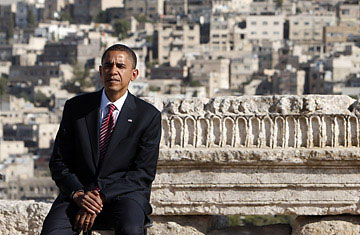
Democratic presidential candidate Senator Barack Obama listens to opening remarks at a press gathering in Amman, Jordan
In his first news conference following his trip to Iraq and Afghanistan, presumptive Democratic nominee Barack Obama acknowledged that General David Petraeus had argued in their private meeting against Obama's 16-month timeline for a U.S. troop withdrawal from Iraq. But Obama said that if elected, he would persist with that plan so that additional troops could be sent to Afghanistan, which he again called "the central front in the war against terrorism."
"As commander on the ground, not surprisingly, [Petraeus] wants to retain as much flexibility as possible in terms of accomplishing their goal," Obama said in a 52-min. question-and-answer session atop a mountain overlooking the Jordanian capital. "What I emphasized to him was that if I were in his shoes, I'd probably feel the same way. But my job as a candidate for President and a potential Commander in Chief extends beyond Iraq." Later in the press conference, Obama added, "The notion is that either I do exactly what my military commanders [say] or I'm ignoring their advice. No, I'm factoring in their advice, but placing it in the broader strategic framework that's required."
Obama gave no indication that what he had seen firsthand in the two hot spots had changed his thinking, only that it had reinforced it. He did applaud the tentative steps that have been made in quelling the violence in Iraq and in bringing political stability to the country. But he stressed that "the U.S. military can't be there forever," and noted that Iraqi leaders, including Prime Minister Nouri al-Maliki, have themselves become more vocal in calling for a definite timetable for U.S. withdrawal. "The message we heard from Iraq's leaders is that they're ready to do more and they want to take more responsibility for their country," Obama said. "I believe that the best way to support Iraqi sovereignty and encourage the Iraqis to stand up is through the responsible redeployment of our combat brigades."
The news conference marked the start of a second phase of Obama's weeklong trip to the Middle East and Europe. His visit to Iraq and Afghanistan was as part of a congressional delegation that included Democratic Senator Jack Reed of Rhode Island, a senior member of the Senate Armed Services Committee, and Republican Chuck Hagel of Nebraska, who has been one of his party's leading critics of the Iraq war. The two Senators flanked him at the news conference.
Beginning with his stop in Amman, the remainder of the trip is being orchestrated by Obama's presidential campaign. And while campaign officials continue to stress that this international journey will be one of substance — including meetings that Obama will hold with leaders here, as well as in Israel, the Palestinian territories, Germany, France and England — the setting of the news conference showed how carefully they are considering stagecraft as they seek to portray the relatively inexperienced Illinois Senator as capable of holding his own in the international arena.
The session was held at the historic Citadel, with the backdrop of the Jordanian capital bathed in amber light. Kites floated lazily in the distance, and despite the sweltering heat, all three Senators wore suits and ties, and stood behind a lectern.
The next phase of the trip — to Israel and the Palestinian territories — may well be the most perilous politically for Obama, as he seeks to strike the perfect note in that diplomatically delicate part of the world. While there, Obama will meet with both Palestinian President Mahmoud Abbas and Prime Minister Salam Fayyad as well as Israeli Prime Minister Ehud Olmert, Defense Minister Ehud Barak and opposition leader Benjamin Netanyahu. His every word will be parsed and closely scrutinized, not only in the region but also at home in the U.S., especially by American Jews, some of whom have expressed reservations about his level of commitment to Israel. During his press conference, Obama highlighted the challenges for both sides in the conflict, citing the day's terror attack in Jerusalem as further reason for why the Israelis are hesitant to make a deal while noting the economic plight of the Palestinians that only exacerbates the situation. "It's difficult for either side to make the bold move that would bring about peace," said Obama. "There's a tendency for each side to focus on the faults of the other rather than look in the mirror."
"What a U.S. President can do," Obama added, "is apply sustained energy and focus on the issues of the Israelis and the Palestinians. And I do believe that the Israelis and the Palestinians are going to both have to make compromises in order to arrive at that two-state solution."
